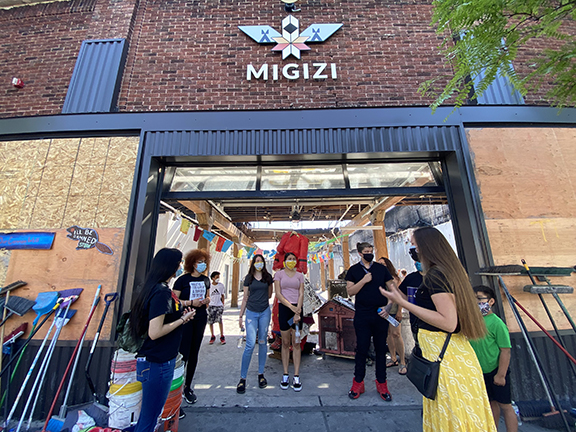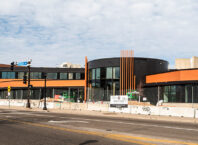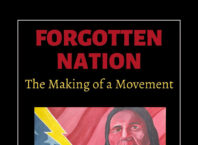
By Lee Egerstrom
When tornado warnings sounded across parts of Hennepin County west and north of Minneapolis in mid-August, Kelly Drummer heard the roar of the threatening storm pass over her family’s home.
“What more could happen? I started pleading, ‘Oh, Lord. Please don’t let this happen, too!’”
Trees were lost in the neighborhood but the Drummer home remained intact.
That was about the only catastrophe to bypass Drummer, president of Migizi Communications, in the past six months.
Migizi’s home base at 3017 S. 27th Avenue burned and was completely destroyed the morning of May 29 as fire spread from nearby buildings. This was part of the carnage in the Lake Street area that followed the death of George Floyd at the hands of Minneapolis police three days earlier.
Drummer is now writing “thank you” notes to about 2,000 people who stepped forward and have raised $2 million to help Migizi find new housing, rebuild, or make other plans for the property. This starts what may need to be a $4 million to $6 million fundraising effort, she said.
Back when the fire happened, Drummer and Migizi staff were working around the clock seeking proper ways to cope with the COVID-19 pandemic for its summer programs.
Migizi would normally have about 40 young people, mostly students in metro area schools, engaged in three major youth development and training programs. This summer, Migizi was able to enroll 20 students for summer programs.
A strong part of the Migizi programs is that it links students with offices, businesses and employers for paid internships where they are both working and learning. Finding internship opportunities in the midst of the infectious pandemic wasn’t easy, Drummer said.
“It was different this year with COVID,” she said. “Businesses are barely making it. It is hard for them to host internships.”
Migizi, the Ojibwe word for “bald eagle,” was started in 1977 with the mission of training young journalists to help overcome stereotypical portrayals of American Indians in mass media.
Its First Person Productions (FPP) arm still does that while now specializing in teaching multimedia with what it describes as, “new and innovative media practices that are used to build local communities.”
A second major program is Green Jobs Pathway (GJP) that trains young people for sustainable, eco-friendly “green” jobs and careers. It seeks to give young people experience and knowledge to work in the green sector by exposure to professional career experiences with alternative energy and construction work.
A third category is the Education, Leadership, and Culture sector that includes programs such as Sacred Visions, Native Academy, and Academic Support. This works closely with school programs at five metro area public school systems to integrate cultural practices with the students’ academic studies.
This latter sector was especially reliant on using Migizi’s new, expanded home base it bought and remodeled in 2018.
COVID-19 is making those programs difficult as well. The participating school districts include Minneapolis, St. Paul, Hopkins, Farmington and Fridley public schools.
Minneapolis and St. Paul schools are starting the new school year with “distance learning,” or mostly on-line learning instructions, with little or no in-person classes or other school meetings or programs.
The suburban school districts were going down to the wire looking at how best to start the school year but were exploring “hybrid,” or partial in-person and online learning formats.
Migizi got through the summer months with a lot of help from its friends.
Classes were shifted to the American Indian OIC facilities and the Minneapolis American Indian Center in the nearby Franklin Avenue’s American Indian Cultural Corridor. Migizi has long established ties with both institutions. American Indian OIC – a part of the Minneapolis public school system – has helped Migizi students with such support as resume building, Drummer said.
Migizi programs have especially close ties with Minneapolis South High School, at 3131 19th Ave. S.
For that reason, Drummer said, Migizi is exploring rental property along Lake Street and close to South High.
“We hope to lease a space for at least two years,” she said. Staff and board members are still working on insurance claims and will be able to put insurance settlement funds in Certificates of Deposit until Migizi resolves whether to buy another site, try to rebuild from the ashes, or find some other long-term solution for its program needs.
“I’m glad we are looking for space,” she said. “Our staff is really tired from not having a home base.”
While Migizi still tries to be nimble to meet program needs for its young people while the COVID pandemic lingers on. And staff also meets with groups and backers on resolving long-term housing plans.
At this point it appears to be easier and less costly to buy and remodel an existing building, like it just did two years ago, rather than to rebuild from the group up on its destroyed site.
Established friendships and relationships along Lake Street and in surrounding neighborhoods appear poised to help by developing a shared vision for how the damaged area might rebuild and strengthen the community.
Dan Kennedy, of Kennedy and Cain PLLC law firm, is organizing affected business owners and others who had damage or destroyed property, or have business disrupted by the fires and unrest that followed the Floyd death in late May.
He has registered and will soon have online a “Longfellow Rising” website that, he said, should help promote the ongoing and redevelopment plans for the affected firms and professional people in that Longfellow neighborhood.
“We have a diverse group. We want to restore and revive what we have,” he said. Among them are Mexican and Indian (the other kind) restaurants, a bank office, liquor store, grocery, other retail establishments along with single-member and small professional offices.
What he hopes, Kennedy said, is that “the antique store model works for us.” That is the old business school logic that a single antique shop may have trouble surviving financially while five such stores will drive traffic and shoppers to the area.
He is hoping, Kennedy said, that Longfellow Rising will help keep Migizi and its Native American students and families a part of the diverse community.
To learn more about Migizi, see their website at: https://www.migizi.org






